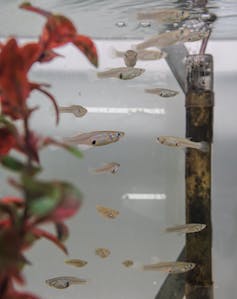In the shimmering shallows of a laboratory tank, a tiny drama unfolds. Male mosquitofish, barely the length of a human finger, are faced with miniature puzzles—mazes, color cues, and obstacles that demand sharp thinking. But this is no idle game. As researchers have discovered, the fish that think fastest and learn best also win the most coveted prize in the animal kingdom: mating success. It’s a finding that challenges the old idea of intelligence as merely a survival tool and suggests something far more tantalizing—that brains, like bright feathers or elaborate dances, may have evolved to charm as much as to endure.
From tank tests to love tests
The study began with an unusual question: could mental agility, rather than just physical prowess, influence mating success in animals? To find out, scientists designed a battery of cognitive challenges for male mosquitofish. Each fish faced tasks measuring spatial memory, self-control, and problem-solving flexibility—skills not unlike those humans use daily.

Once the tests were complete, the researchers released the males into controlled ponds with females. What happened next was telling. The high-performing puzzle solvers consistently fathered more offspring than their slower-learning peers. It was as if the cognitive victories in the lab translated directly into romantic victories in the water. This direct link between intelligence and reproductive success offered rare, concrete evidence for a long-theorized idea: that brains can be as much a mating signal as a survival tool.
Why cleverness could be a mating signal
In evolutionary biology, intelligence has often been framed as an adaptation for survival—helping animals find food, navigate complex environments, or avoid predators. But the mosquitofish results point to a second, equally compelling force: sexual selection. Here, intelligence may work like a peacock’s tail—costly to maintain, but irresistible to potential mates.
A quick-witted male might more effectively court females, outcompete rivals in subtle social maneuvering, or simply project an aura of competence that signals good genes. In mosquitofish, this advantage seems to manifest not through showy displays, but through a hidden layer of behavioral sophistication, revealed only when life—or love—poses a puzzle to solve. This raises the intriguing possibility that intelligence, in many species, might be a silent but potent part of courtship.
Parallels across the animal kingdom
The idea that brains can evolve partly through mate choice isn’t limited to fish. In birds, for instance, females often prefer males who sing complex songs, a skill tied to cognitive capacity. In primates, social intelligence—managing alliances, reading subtle cues—can be just as important as physical strength in winning partners. Even in insects, problem-solving ability can make a difference: male fruit flies that learn to associate certain cues with courtship tend to have more mating success.
What makes the mosquitofish case special is the clarity of the data. Rather than relying on indirect signs, the researchers tracked both cognitive scores and reproductive output, creating a direct map from mental skill to evolutionary payoff. The finding suggests that sexual selection on intelligence could be more widespread than previously recognized, shaping brains in ways we’ve yet to fully appreciate.
Rethinking intelligence in evolution
This research invites a subtle but important shift in how we view intelligence. It’s not just a tool for scraping through life’s hardships—it might also be a luxury, a display, a signal of genetic quality. In this light, the evolution of complex cognition could be driven as much by the need to attract and keep mates as by the need to outwit predators or find food.
For humans, this lens is equally provocative. Our capacity for language, art, humor, and abstract thought may have deep roots not only in problem-solving for survival but in the courtship dance—where wit, creativity, and mental agility could signal vitality and desirability. The mosquitofish, humble as they are, remind us that intelligence is a multi-faceted trait, shaped by forces both practical and romantic. And sometimes, in evolution as in life, being smart really is the sexiest thing of all.





